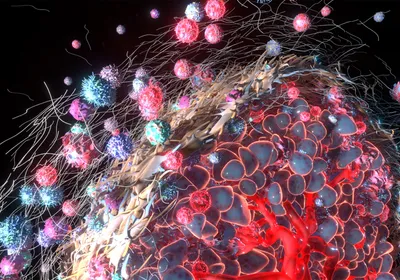Researchers have discovered a new category of cancer caused by chromatin recognition gone awry. An aberrant protein that binds to activated DNA-winding proteins drives up gene expression leading to unchecked cell growth, according to a study published online yesterday (May 10) in Nature.
Several forms of the blood cancer acute myeloid leukemia (AML) are marked by a chromosomal crossover, or translocation, between the genes that code for two protein fragments: a short, common protein motif known as the plant homeodomain (PHD) finger, which is involved in chromatin recognition and gene regulation, and a large protein responsible for trafficking RNA into and out of the nucleus, called nucleoporin-98 (NUP98).
How these translocations bring about cancer, however, was largely a mystery.
"We now have a much better sense for why those translocations would be messing up the cell and promoting cancer," Or Gozami, a molecular cancer biologist at Stanford University who was ...























